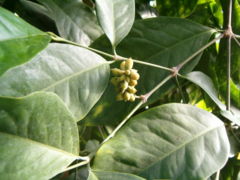Gnetum
(Redirected from Gnetum indicum)
| Gnetum subsp. var. | ||||||||||||||||||||||||||||||||||||||||||||||||||||||||
|---|---|---|---|---|---|---|---|---|---|---|---|---|---|---|---|---|---|---|---|---|---|---|---|---|---|---|---|---|---|---|---|---|---|---|---|---|---|---|---|---|---|---|---|---|---|---|---|---|---|---|---|---|---|---|---|---|

|
|
| ||||||||||||||||||||||||||||||||||||||||||||||||||||||
| ||||||||||||||||||||||||||||||||||||||||||||||||||||||||
Gnetum is a genus of about 30-35 species of gymnosperms, the sole genus in the family Gnetaceae and order Gnetales. They are tropical evergreen trees, shrubs and lianas. Unlike other gymnosperms they possess vessel elements in the xylem. Some species have been proposed to have been the first plants to be insect pollinated as they occur in association with the extinct pollinating scorpionflies.[1]
Many Gnetum species are edible, with the seeds being roasted, and the foliage used as a leaf vegetable. Some are also valued in herbal medicine.
Cultivation
Propagation
Pests and diseases
Species
- Gnetum sect. Gnetum
- Gnetum subsect. Gnetum - 2 species of trees; southeast Asia
- Gnetum subsect. Micrognemones - 2 species of lianas; tropical west Africa
- Gnetum subsect. Araeognemones - 9 species of lianas; tropical South America and Central America - Ituá
- Gnetum sect. Scandentia - about 20 species of lianas; southern Asia
- Gnetum subsect. Stipitati
- Gnetum subsect. Sessiles
- Gnetum acutum
- Gnetum bosavicum
- Gnetum cleistostachyum
- Gnetum cuspidatum
- Gnetum diminutum
- Gnetum globosum
- Gnetum gnemonoides
- Gnetum hainanense
- Gnetum klossii
- Gnetum leptostachyum
- Gnetum loerzingii
- Gnetum luofuense
- Gnetum macrostachyum
- Gnetum microcarpum
- Gnetum neglectum
- Gnetum oxycarpum
- Gnetum parvifolium
- Gnetum raya
- Gnetum ridleyi
Gallery
-
photo 1
-
photo 2
-
photo 3
References
- ↑ Ren D, Labandeira CC, Santiago-Blay JA, Rasnitsyn A, Shih CK, Bashkuev A, Logan MA, Hotton CL, Dilcher D. (2009). Probable Pollination Mode Before Angiosperms: Eurasian, Long-Proboscid Scorpionflies. Science, 326 (5954), 840-847. Template:DOI
External links
- w:Gnetum. Some of the material on this page may be from Wikipedia, under the Creative Commons license.
- Gnetum QR Code (Size 50, 100, 200, 500)
